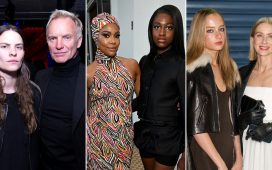Four years ago, the rapper Michael Render, better known by his stage name, Killer Mike, endorsed Bernie Sanders for President. “I am here as a proponent for a political revolution,” Render told the crowd at a Sanders rally in Atlanta, where he lives. He had shared a meal with Sanders at Busy Bee Café, a soul-food restaurant; afterward, he told reporters that he and the Vermont senator were “two angry radical guys, one seventy-four and white, one forty and black, finding common ground.” Sanders was the only candidate who was discussing the kinds of changes in domestic and foreign policy that Render thought the country needed. Talking with a TMZ interviewer about American imperialism in August, 2016, after Sanders lost the Democratic nomination, Render said, “If you’re voting for Trump or Hillary Clinton, you’re voting for the same thing.”
Render stands by that remark, he told me recently, at a restaurant in Greensboro, North Carolina. “African-Americans do not have an agenda that’s truly recognized in this country,” he said, explaining his views on Clinton versus Trump. “How would that have been different with her? It’s not like I’m saying, ‘Oh, she’s Trump.’ I’m saying, in the way that it affects my communities, I don’t see where much good could have come out of electing her.” Render had come to Greensboro to stump for Sanders again. He and the senator have stayed in touch, he said—Sanders appears in Render’s iPhone contacts as The OG. “He texts pretty cool. You wouldn’t know you’re talking to a seventy-something-year-old dude,” Render said. Recently, he and Sanders had messaged about reparations. Sanders had been opposed to the idea, but, in April, he announced that he would sign a bill funding research into the subject. “I educated him on that,” Render said.
Render is a big man with a broad paunch and a thick beard; he wore baggy camouflage pants, a black T-shirt, and a gold chain with a miniature rendering of “Perseus with the Head of Medusa,” a work by Cellini, his favorite sculptor. Having just come from the airport, Render did not have his Glock, which he otherwise carries almost everywhere. (He also keeps an AR-15 by his bed.) Render credits his attitude toward guns, and the Second Amendment, in part to his father, who was a cop and a member of the National African American Gun Association. “Any new law that is introduced to affect gun ownership will affect African-Americans first and worst,” Render told me. “I’m not giving up shit.” (In 2016, Clinton criticized Sanders as a “pretty reliable vote for the gun lobby”; Sanders has actually voted for gun control more often than not.)
The first of the day’s campaign events was held at the International Civil Rights Center & Museum, which is housed in a brick-and-stone building that was once a Woolworth’s; a famous sit-in took place there in 1960. About ten Sanders staffers and surrogates, including the actor Danny Glover and Ben Cohen, of Ben & Jerry’s, assembled in the lobby. Sanders arrived and gave Render a fist bump. He and the surrogates were then given a brief, private tour of the museum. A screen showed Martin Luther King, Jr., delivering the “I Have a Dream” speech. Sanders turned to Render. “That’s me,” he said quietly, pointing at a gangly, glasses-wearing white guy in the crowd. It wasn’t him. (“He’s got a hell of a sense of humor,” Render told me later.) When the tour ended, Sanders thanked the docent. “It’s a reminder that we have a horrific and ugly history, and that there’s still lots of work to do,” he said.
A few days before, the Working Families Party, which endorsed Sanders during the last Presidential campaign, announced that, this time, it was supporting Elizabeth Warren. The news fit one of the narratives that had emerged over the summer: Warren, who may be to the right of Sanders but is certainly to the left of Clinton, was picking up support from people who might otherwise have voted for Sanders. Render told me that Warren was his second-favorite candidate. “I’ve liked Elizabeth since the nineties,” he said. But, he added, “It’s hard to beat Trump without the antithesis of him. It’s hard to beat Magneto without Professor X. And I think that’s Sanders.”
The day’s second stop was Prestige Barber College, an African-American establishment in a former cleaners on the northeast side of town. About a hundred people, including a dozen or so getting their hair cut by student barbers, gathered in a large, fluorescent-lit room. When it was Render’s turn to speak, he held forth on Sanders’s commitment to criminal-justice reform and his history of activism. “He is one of the first people I’ve seen run for public office who has the proof in pictures—that he got drug out by the police with us,” he said. “Not that he sympathized. Not that ‘my heart was hurting.’ Naw, I saw this skinny-ass kid in glasses getting drug off.” He went on, building toward a crescendo: “I like Benjamin Franklin, but I love John Brown. Benjamin Franklin said a lot of cool stuff about liberty. John Brown picked up arms against people who looked like him to get my freedom.”
The barbers had mostly stopped barbering. Glover, who had looked sleepy during some of the earlier remarks, was wide awake. Cornel West had joined the group; he laughed slowly and deeply, a sound of agreement. “You put a smile on Curtis Mayfield’s face,” he told Render afterward. “Nina, too.” Render looked thrilled. “How the fuck you not gonna ride with Cornel West?” he asked me later.
Sanders spoke next, offering a broad overview of his positions on a number of issues and insisting that his administration would “attack racism in every conceivable way.” During a Q. & A. that followed, a black trans woman in the audience said to Sanders, “I hear what you’re saying about what you’re doing for the whole of black folks and poor folks. How do queer people and trans people fit into your campaign?” Sanders put his arm around the questioner. “They fit in the way that everyone else fits in,” he said. “We’re going to fight for a non-discriminatory system.” He added, “We kind of look at people as human beings. Everybody. We treat people alike. And we’re going to do our very best to break down the racist, the sexist, and the homophobic, and all the other barriers.” He then told a story about his work, during his time in Congress, to expand gay rights in Vermont, which legalized civil unions in 2000 and gay marriage in 2009.
When the event was over, a twenty-year-old barber-in-training from Greensboro who cuts under the nickname Dice and raps under the moniker Lil Mazi told me that he was now convinced that he should vote for Sanders. He had just given a fade to a twenty-one-year-old vegan chef who was also from Greensboro. “Some enlightenment, some awareness,” the chef said, offering his verdict on the speakers. “But I’d love to see more action. We talk a lot. We have a bunch of plans. But it’s really time for execution.” He said that he didn’t vote for Clinton or Trump in 2016, and that he’s currently undecided.
In a black S.U.V. on the way to the next event, Render said that he was happy with how things had gone, and noted that Sanders had done more listening than talking. The senator could have addressed more specfically the challenges facing trans people when explaining how queer and trans people fit into his campaign, rather than talking about the fight for same-sex marriage, but Sanders was always learning, Render said: “He comes with the spirit of a student.” Render said he was learning, too. Recently, on a B.E.T. panel about politics, he used the term “illegals.” His publicist subsequently taught him why he should not. On the same panel, Render said that “America is always going to have a slave class,” and that comment also generated some online controversy. Render said the remark had been misunderstood. “Only in the current way that we run the system,” he explained.
At forty-four, Render straddles something of a generation gap among black voters. Those younger than he is tend to support more progressive candidates, including Sanders, while older black voters have, to this point, overwhelmingly supported Joe Biden. “You got the old black Democratic establishment that toes the line for the D.N.C.,” Render said. “They’re gonna go with what the Party is saying. I’m disappointed in a lot of them and the political leaders for not taking a chance.” A recent story in the Times noted that many young black voters were asking older relatives to support more progressive candidates. Render said he had won over a few family members to Sanders’s cause. His dad, he said, “can be a little conservative, but he likes Bernie.” He added, “I’m always pushing him. I’m gonna put a Bernie sign in his yard. I think I got three of my five sisters voting Bernie. That ain’t bad.”
The final stop was Bennett College, a historically black school for women. There, in a packed hall, Cohen talked about getting busted, as a young man, for smoking marijuana, and how much worse off he would have been if he were black. Glover said, “If we can imagine it, if we can dream it, we can make it real.” Render gave a stem-winder that ended with a fiery call and response. “The time is!” Render shouted. “Now!” the crowd replied. Sanders looked impressed. He and Render embraced, and the rapper rushed to another room to film a segment for a student YouTube channel.
The college choir had sung before the speeches. Afterward, two of its members stood outside, wearing blue robes and large smiles. A political-science major from Washington, D.C., said that she had been stuck between Sanders and Biden but now she was “seventy-five-per-cent likely” to vote for Sanders. She liked what he had said about equal pay for women and how he had addressed the burden of student debt. A vocal-performance major from San Diego told me that she had always liked Sanders. “I love that he’s trying to make college free, for one, because I go to a private H.B.C.U. and it’s very expensive for my dad.” She also noted his position on marijuana. “I have friends, personally, who have gotten into trouble because of marijuana, so I do like that he’s trying to legalize that.”
Within the hour, Render was back in the S.U.V., headed to the airport for a flight home to Atlanta. On the way, he asked the driver to pull into an empty parking lot. “I smoke that heavy indica shit from Humboldt,” he said, retrieving his stash from a Pierre Cardin backpack. “That put-your-ass-to-sleep shit.” His doctor had told him to avoid sugary edibles. “If I’m gonna eat my weed, it has to be in sautéed stuff like ham and shit, but I’d rather just smoke,” Render said. He took a few hits and described his devotion to Sanders. “My wife is black with freckles, weird-colored eyes, red hair,” he said, before extolling some of her other physical attributes. “And that doesn’t even equate to how smart she is,” he said. “As much as we fight, probably never gonna leave her. Probably never gonna find another you. That’s how I feel about Sanders. We’re not gonna get another. We got Eugene Debs a hundred years ago. You want to wait another hundred years?”
He exhaled a cloud of smoke. “Like, I really fucking love this country,” he said. “A lot of black guys don’t say this, but I really fucking do. It’s just, we’re fucking this up. That’s really how I feel most days. Like, we’re really fucking this up. Sanders should be an easy pick. That’s what I’m saying. It shouldn’t even be a dog fight. I really believe in the old guy. If he does win,” he added, “I’m gonna try to convince him to take a hit in the White House. If he fucking wins, I’m smoking in the White House, too.”








